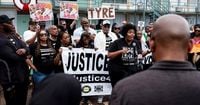In a dramatic turn for one of the nation’s most closely watched police brutality cases, a federal judge in Memphis has ordered a new trial for three former police officers convicted in the fatal beating of Tyre Nichols. The decision, handed down by U.S. District Judge Sheryl H. Lipman on August 28, 2025, comes after months of legal wrangling and renewed debate about fairness, judicial conduct, and the enduring legacy of Nichols’ death.
The officers—Tadarrius Bean, Demetrius Haley, and Justin Smith—were originally found guilty in October 2024 of obstruction of justice through witness tampering, related to their attempts to cover up what happened during the violent arrest of Nichols. The 29-year-old Black man was pulled over for alleged reckless driving on January 7, 2023. What followed, caught on police cameras and later broadcast nationwide, shocked the conscience of a country already grappling with the issue of police violence: Nichols was yanked from his car, pepper-sprayed, struck with a Taser, and, after he fled, was beaten with fists and a baton by five officers just steps from his home. He died three days later.
According to BBC, the incident was so egregious that it unleashed a wave of protests across the U.S. and reignited calls for police reform. The officers, all members of the now-disbanded Scorpion Unit—a crime suppression team targeting drugs, guns, and violent offenders—became the focus of both state and federal investigations.
But the legal aftermath has been anything but straightforward. The three officers at the center of this new trial order had already been acquitted of state charges, including second-degree murder, aggravated assault, and kidnapping, earlier in 2025. Their federal convictions for witness tampering, however, remained until this week’s ruling.
What prompted Judge Lipman’s extraordinary decision? It all centers on the conduct and comments of the original trial judge, Mark S. Norris. As reported by the Associated Press and corroborated by court documents, Norris was alleged to have harbored a belief that at least one of the officers was a gang member. This suspicion, according to filings, stemmed from an incident in October 2024, when one of Norris’s law clerks was shot during an auto theft. In a meeting with the U.S. Attorney’s Office and an FBI agent, Norris reportedly stated that he believed the intended target of the shooting was the former law clerk who had worked on the Nichols case—and that the clerk had been seen by one or more of the defendants during the trial.
“Judge Norris made the gang statements on at least two occasions, demonstrating that it is a firmly held belief, not an off-hand remark,” wrote Haley’s attorney in court documents, as cited by WMC Action News 5. Smith’s attorney echoed the concern, arguing that Norris’s comments reflected a “deep-seated bias against the defendants and the Memphis Police Department.”
That bias, the defense insisted, undermined the fairness of the trial. And Judge Lipman agreed. In her order, she wrote, “Because the risk of bias here is too high to be constitutionally tolerable, and because ‘[j]udicial bias is structural error, not susceptible to . . . harmless error analysis[,]’ a new trial is necessary.” The ruling unsealed several pre- and post-recusal filings, revealing the depth of concern within the defense and the U.S. Attorney’s Office about the impact of Norris’s beliefs on the integrity of the proceedings.
Federal prosecutors had argued that there was no evidence Norris “harbored any bias before or during trial, let alone the type of extreme bias that would warrant the extraordinary remedy of a new trial.” Nonetheless, Lipman found that, despite Norris’s decisions being “sound, fair, and grounded firmly in the law,” the appearance and risk of bias were simply too great to ignore.
Judge Norris, a former Republican state senator and appointee of President Donald Trump, recused himself in June 2025, just days before sentencing. In a statement released through his judicial office, Norris said, “Because of the code of judicial conduct, I cannot make a statement on this matter.”
For the families and communities affected, the legal drama has been both exhausting and bewildering. The officers’ defense teams have expressed vindication at the order for a new trial. Martin Zummach, attorney for Justin Smith, told WMC Action News 5, “Judge Lipman got it right.” Bean’s lawyer declined to comment, while Haley’s attorney did not immediately respond to requests for input. The Memphis Police Department also declined to comment.
The two other officers charged in the federal case, Emmitt Martin and Desmond Mills Jr., pleaded guilty before the trial began and are not included in the new trial order. Both avoided state court trials after reaching plea agreements. None of the five men has yet been sentenced for their roles in Nichols’s death.
The case continues to stir deep emotions in Memphis and beyond. Video of the beating, which showed officers milling around, talking, and laughing as Nichols struggled with his injuries, was a catalyst for national outrage. Nichols’s desperate cries for his mother during the assault became a haunting symbol of vulnerability and injustice. The Scorpion Unit, to which all five officers belonged, was disbanded weeks after Nichols’s death amid criticism that it had used excessive force against unarmed people.
As BBC noted, the Nichols case is now a touchstone in the ongoing debate over how America polices its communities—and how the justice system handles accusations of police misconduct. The retrial order, while procedural in nature, underscores the importance of impartiality and public confidence in the courts. Legal experts say that even the appearance of judicial bias can erode trust in the outcome, no matter how scrupulously the law is followed.
What happens next? Judge Lipman has not yet set a new trial date and has ordered lawyers to submit their positions on which charges should be retried. The implications are significant, not only for the defendants but for the broader conversation about accountability and reform. For now, Haley remains in federal custody, while Bean and Smith are on limited release.
The Tyre Nichols case, with its layers of tragedy, outrage, and legal complexity, remains far from over. As the city of Memphis braces for another chapter in this painful saga, the nation will be watching—hoping that justice, in all its forms, is finally served.



